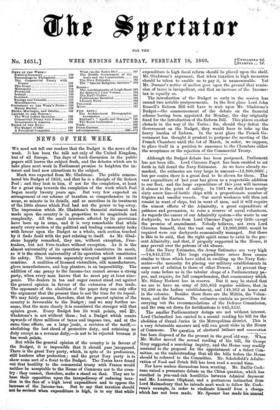NEWS OF THE WEEK.
WE need not tell our readers that the Budget is the news of the week. It has been the talk not only of the United Kingdom, but of all Europe. Ten days of hard discussion in the public papers still leaves the subject fresh, and the debates which are to take place next week in Parliament promise to heighten the in- terest and lend new attractions to the subject.
Much was expected from Mr. Gladstone. The public remem- bered his Budget of 1853, and that he is a disciple of Sir Robert Peel ; and they look to him, if not for the completion, at least for a great step towards the completion of the work which Peel began nearly twenty years ago. But very few expected an arrangement of our scheme of taxation so comprehensive in its scope, so minute in its details, and so merciless in its treatment of the little abuses which Peel had not the power to lop away. The impression which Mr. Gladstone's financial statement has made upon the country is in. proportion to its magnitude and complexity. All the small interests affected by its provisions have been up in arms, and it is very remarkable that while nearly every section of the political and trading community looks with favour upon the Budget as a whole, each section touched by it finds fault with the part relating to itself. As Mr. Glad- stone happily remarked, they are, without exception, Free- traders, but not Free-traders without exception. As it is the almost universality of its operation which constitutes its merit, so it is the almost universality of its operation which constitutes its safety. The interests separately arrayed against it cannot combine. A coalition of licensed victuallers, silk manufacturers, glove manufacturers, and hop planters, is an impossibility. The addition of one penny to the Income-tax cannot arouse a strong party, when every man knows that he must pay at least nine- pence. The dealers in tea and sugar cannot stand out against the general opinion in favour of the extension of free trade. The opponents of the abolition of the paper duty can only offer the argument that the present time is not the time for its repeal. We may fairly assume, therefore, that the general opinion of the country is favourable to the Budget ; and we may further as- sume, that the more closely it is considered the stronger will that opinion grow. Every Bridget has its weak points, and Mr. Gladstone's is not without them ; but a Budget which remits upwards of three millions of taxes and imposes two, and at the same time effects, on a large :scale, a revision of the tariff,— abolishing the last shred of protective duty, and retaining no duty except as a revenue duty,—is not to be rejected bemuse it has weak points.
But while the general opinion of the country is in favour of
the Budget, it is impossible that it should pass :unopposed. There is the great Tory party, which, in spite of its professions, still hankers after protection ; and the great Tory party is to show some sort of a front to the Budget. The Tories have found out that hostility to the commercial treaty with France would neither be acceptable to the House of Commons nor to the coun-
try : they cannot, therefore, make a stand on that. They are to base their opposition upon the inexpediency of reducing taxa- tion in the face of a high level expenditure and to oppose the increase of the Income-tax. But to say that taxation should not be revised when expenditure is high, is to say that while
expenditure is high fiscal reform should be placed upon the shelf. Mr. Gladstone's argument, that when taxation is high measures should be taken to enable us to pay it, is unanswerable. Yet Mr. Ducane's notice of motion goes upon the ground that remis- sion of taxes is inexpedient, and that an increase of the Income- tax is equally so. The introduction of the Budget so early in the session has caused two notable postponements. In the first place Lord John. Russell's Reform Bill will have to wait upon Mr. Gladstone's Budget—the commencement of the debate on the financial scheme having been appointed for Monday, the day originally fixed for the introduction of the Reform Bill. This places another obstacle in the way of the Tories ; for, should they defeat the Government on the Budget, they would have to take up the heavy burden of Reform. In the next place the French Go- vernment has thought it prudent to postpone the meeting of the French Chambers until the 1st of March, in order, we suppose, to place itself in a position to announce to the Chambers either the acceptance or the rejection of the Commercial Treaty.


























